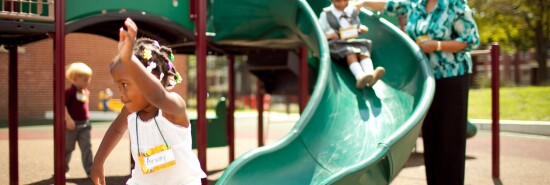
‘No loitering at slide entry or exit’: Not everything needs to be legislated
Timothy P. Carney
Video Embed
Across three different homes, my backyards have generally had a play set with a slide. Because my children often played on these slides and monkey bars with just their siblings or a handful of friends, they developed habits that might count as a bit antisocial on a packed public playground: My kids might climb up a slide that some other kids were about to come down, or they might take their time going down the slide, inconveniencing everyone behind them.
They had to learn these lessons. When they were younger, I would explain to them that when crowded at a public park, slides, in general, were for going down, and that hanging out at the top for too long was rude to the people behind them.
GAVIN NEWSOM’S CASE AGAINST ELECTING DEMOCRATS
As my children got older, they learned some of these playground rules in harder ways: They just stood, oblivious, at the bottom of a slide and thus got knocked to the mulch by the kid behind them. They experienced annoyance waiting behind some kid who posed or shouted or otherwise took his time right at the top of the slide.
Also, these guidelines applied only in certain circumstances. If we were the only family on the jungle gym, they could be more anarchic in their play. If there were no very young kids climbing, and everyone was up for it, a chaotic game could develop with kids going up and down the same slides simultaneously, crashing into one another.
Learning the norms and customs of different places, and when and with whom they do and don’t apply, is part of the benefit of playgrounds.
The folks in charge of one playground in my county see it differently, though. Lenore Skenazy at Reason magazine reports from Fairfax County, Virginia. The rules at the playground include, but are not limited to:
Do not use when playground is wet or when ground is frozen. Equipment to be used only as manufacturer intended. Do not wear clothing with drawstring … Do not climb safety rails, walls … No twirling or jumping from swings Sit in upright position [on slides] Do not climb on slides No loitering at slide entry or exit Do not skip rings or rungs [on monkey bars]
Some of these are just silly nannyism for a play set that’s about five feet high and sitting on a spongy play surface. Nannyism and helicopter parenting are a plague. Kids don’t take enough risks and are proverbially swaddled in bubble wrap for way too long, and they grow up fragile.
But some of these rules are efforts to codify the reasonable playground norms that kids have to learn, and this is the more interesting part for me.
A particular error of 21st-century America is that institutions insist on legislating, writing down and posting and formally enforcing, norms that traditionally were learned, and more informally enforced. I’ve seen in millennial-run coffee shops signs laying out exactly how long you were allowed to stay and use wifi based on how many drinks or food you bought, and the minimum party size for sitting at certain-sized tables.
CLICK HERE TO READ MORE FROM THE WASHINGTON EXAMINER
These rules were mostly sensible and comported with good manners, but once they are written down and posted, they go from being good manners to being legislation. It’s even more true when it’s the county government regulating 5-year-olds on a jungle gym.
Legislating our norms removes the ability for nuance, and leads to less humane interaction and less neighborliness.
